STORY HIGHLIGHTS
- Mexican youth movement adding fuel to frenzy leading up to Sunday presidential vote
- About a third of Mexico's 79.4 million registered voters are between 18-29
- Unemployment rate of those 15-24 is nearly 10%, double the national average
- Officials estimate that millions of young Mexicans, known as "ninis," neither study nor work
Five weeks ago, they were scrambling to finish homework assignments and studying for exams at Mexico City's Iberoamerican University. Before then, many of them had never met.
Now, the students huddle in a tight circle at a weekend protest, stack their hands in the middle and belt out a school cheer: Wolves, howling, on the path to truth. Ow-ooo. Ow-ooo. Ow-ooo.
They have become high-profile protagonists in a swelling youth movement that has drawn attention from the nation's presidential candidates and added fuel to the political frenzy leading up to Sunday's vote.
They protest by day and plan by night, using social media as a key weapon in their offensive.
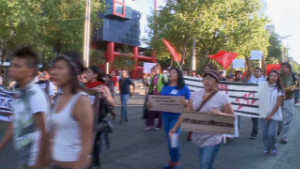 Mexico protesters rally ahead of vote
Mexico protesters rally ahead of vote 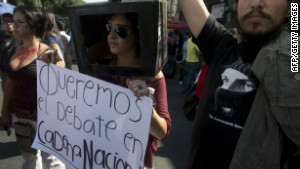 #yosoy132
#yosoy132 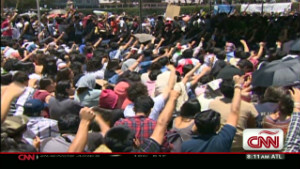 La fuerza del cambio
La fuerza del cambio  #yosoy132
#yosoy132
A video they made has garnered more than 1.1 million views on YouTube. Three of four candidates squared off in an online presidential debate they helped organize. Thousands of youth across the country are wearing T-shirts and waving signs that support them.
"It's like a storm, getting stronger," says Luis Sosa, a 25-year-old graduate student who marched in Sunday's protest in the nation's capital. "It's the first time in a long time that young people have raised their voice."
Mexico's 'lost generation'
By the numbers, the picture for Mexico's young people is bleak.
Analysts point to them as the most common casualties in a brutal drug war that has claimed more than 47,500 lives in fewer than six years.
And the unemployment rate of those aged 15 to 24 is nearly 10%, double the national figure.
"Being young, poor and living in the wrong place adds up to a death sentence," academic Alberto Aziz wrote in a 2010 column for Mexico's El Universal newspaper.
Officials estimate that millions of young Mexicans neither study nor work. They are known the ninis -- Spanish for neither, nor. Some have called them Mexico's "lost generation."
"Many young people, when they finish middle school, they are left for years with no direction," says Norma Escobar, strategy recruitment director at the Manpower employment agency in Mexico City.
The problem is so prevalent that government-sponsored youth addiction centers across the country offer brightly colored brochures for ninis alongside handouts that warn against smoking, alcohol and drugs.
"If they ask you, 'do you work or do you study?' and you cannot answer, this information is for you," the brochure's cover says.
"Between 7 and 9 million youth like you neither study nor work," the brochure says, advising readers to try different activities like playing sports, volunteering or learning a language.
More than 100 government-sponsored Juvenile Integration Centers across the country have programs aimed at keeping ninis off the streets.
"Our goal is to keep them from falling into the world of drugs," says Juan Ramiro Vazquez Torres, a regional coordinator based in Mexico City.
If they don't, the consequences can be dire.
Last year, a judge sentenced a 14-year-old boy to three years in a correctional facility after he was found guilty of torturing and beheading at least four people while working for the South Pacific drug cartel.
Mexican youth are "the most affected not just by unemployment, but also by the lack of health care coverage, discrimination, violence and the fight against organized crime," according to a study released in April by Metropolitan Autonomous University sociology professor Enrique Cuna Perez.
Those same factors discourage young people from believing in the country's democracy, he says.
About a third of Mexico's 79.4 million registered voters are between the ages of 18 and 29.
According to Cuna's study, 75% of young Mexicans surveyed said they weren't planning to vote in this year's presidential elections.
'Like trying to put out a fire with gasoline'
Young faces flash by in the video, one by one.
Bunk beds and pink wallpaper and photo collages appear behind them.
They say their names and hold their school IDs and repeat, "We are students from the Ibero."
Days earlier, they booed and chanted "get out" when presidential candidate Enrique Peña Nieto visited the Iberoamerican University.
Officials from Peña Nieto's campaign quickly dismissed the May 11 protest, saying the outbursts were not from students but from outsiders dragged there by political operatives to cause commotion. As he rushed out to a waiting car, the candidate told CNNMexico he did not believe that the protesters were genuine.
"That," says 22-year-old communications student Federico Gomez, "was like trying to put out a fire with gasoline."
Three days later, the students fired back on social media, promoting a video on YouTube titled "131 students from the Ibero respond."
The day the video went up, it became a trending topic on Twitter, says Rodrigo Serrano, one of the students who helped edit it. In 24 hours, it was viewed half a million times.
Students at other universities quickly showed their solidarity, posting links to the video on Twitter and Facebook with the hashtag #YoSoy132 (I am 132).
That small catchphrase became the name for something much larger. What started with 131 students at one school in Mexico City has expanded into a political movement that includes more than 100 universities throughout the country.
#YoSoy132 has committees and meetings, strategies and spokesmen.
Its activism moves fluidly from social media to the streets, with tens of thousands of students marching in numerous demonstrations in Mexico's capital and throughout the nation.
Support for the movement extends beyond Mexico's borders. A post on an Occupy Wall Street website last month called on supporters of the U.S.-based movement to "express solidarity with the Mexican Spring."
Students from the Ibero say they hoped to draw attention to their cause but never expected the group to grow so large or so fast.
"I never thought I'd see something like this in my generation," says Sosa, the grad student.
He notes there are parallels -- but also significant differences -- between the Mexican youth protests and the so-called Arab Spring demonstrations that toppled governments in the Middle East.
"We are not clamoring for democracy like they are," he says. "We are defending our democracy."
Sosa and other participants in the movement say #YoSoy132 has no political affiliation but opposes the candidacy of Peña Nieto, whose Institutional Revolutionary Party ruled Mexico for more than 70 years until it was ousted in 2000 elections.
They also criticize Mexican networks Televisa and TV Azteca, which control more than 90% of the market in a country where the vast majority of people still get their news and information through broadcast television.
Protesters say Televisa and TV Azteca have showered Peña Nieto's campaign with favorable coverage. The broadcasters deny it, saying each candidate has been given equal time.
Sharp rebukes of the student movement have continued to come from Peña Nieto's campaign and supporters, who accuse the students of being partisan, disingenuous and disrespectful.
When #YoSoy132 hosted an online presidential debate this month, Peña Nieto sent a letter declining the movement's invitation to attend, saying, "the group's political position against me and my proposals ... does not guarantee the space of neutrality that is required to conduct a debate in conditions of equality."
But the other three candidates attended, with the surge in youth activism drawing attention from both ends of the political spectrum.
Josefina Vázquez Mota of the conservative ruling National Action Party has pledged to make young people an integral part of her government.
"I am not going to consult with young people," she told a separate online town hall meeting this month. "I am going to ask them to come build with me."
Andres Manuel López Obrador of the left-wing, opposition Democratic Revolution Party recently told a crowd of young supporters that he understood why they were clamoring to be heard after years of policies that left them unemployed and undereducated.
"The role you are playing is fundamental," he said, "because young people have been sacrificed all this time."
Pushing for Internet access
A sea of students marches past the offices of some of Mexico's largest newspapers on Sunday, a week before the presidential vote. About a dozen students from the Ibero's 131 are among them.
As the crowd walks by an intersection known as the Corner of Information, they call out in unison, "We are not one. We are not 100. Sold-out press, count us well."
Federico Soto bangs on a bongo drum, chanting with the crowd.
He and many of those around him are pushing for more Mexicans to turn to the Internet and social media for their news rather than relying on traditional outlets.
Media bias, they argue, is a problem that goes beyond campaign season -- and a problem that more widespread Internet availability could solve.
"We want free Internet, accessible for everyone," Soto says.
About 95% of Mexican homes have a television, while 22% have Internet service, according to the country's 2010 Census.
"There are still many people without connections, and the connections we have are costly and of poor quality," says Raul Trejo Delarbre, a professor who studies social media at the National Autonomous University of Mexico.
It's no surprise that #YoSoy132 would be pushing for more Internet access, he says. The social media skills of its members have been a key part of their success.
"This movement is made of young people who have grown up with the Internet," he says. "It is a continuation of their daily space."
But social media savvy isn't enough to maintain a movement, says Trejo. The leaderless group -- accused by critics of lacking direction -- must better define its main demands, he says.
"We'll see what happens after the elections," he says.
'This is the beginning'
Members of the movement say they're committed to its staying power, no matter what happens Sunday.
"We are ninis," one demonstrator's sign says at Sunday's protest. "We neither give up nor shut up."
Nearby, a girl with blue streaks in her hair and braces on her teeth hoists a huge, hand-painted sign.
"Mexico woke up," it says in curvy letters surrounding an image of a flowering cactus.
The girl holding the sign, Selene Galindo Enriquez, says she woke up too after she saw the Ibero students' video online and then starting doing more research.
"I realized there were other people who think the way I do," says Enriquez, 20, who plans to vote for the first time Sunday.
Her friends tried to dissuade her from participating in the movement, telling her it was a waste to spend time with people "who make noise but don't know why." But she started coming to protest marches and other #YoSoy132 events anyway, her mother at her side.
"We'll see what happens, because who knows how many of us there are," she says. "This is the beginning of many things."
Someone shouts into a megaphone, "Let's go to Televisa," and the crowd of protesters winds down a side street toward the media giant's studios.
This time, the Ibero students opt out. There is only a week until the election and much to be done. More social media campaigns. A protest the day before the vote. Training election observers.
They pile into cars and pull away from Mexico City's main drag but minutes later cross paths with throngs of protesters, marching toward the television station to protest its coverage.
Demonstrators file across the street wielding banners that say "Turn off your television, turn on your brain" and "We are more awake than ever." Many wave signs saying "#YoSoy132."
One of the Ibero students, Federico Gomez, pounds his car horn in a show of support. The crowd cheers. He sticks his arm out the window and pumps his fist in the air as traffic cops wave him past.
Sosa sits in the passenger seat, flipping through the pages of a comic book and skimming his Twitter feed. A pop song blares through the car's speakers.
TonightWe are youngSo we'll set the world on fireWe can burn brighter Than the sun
They are on the way to a classmate's house to plan the group's next move.
From around the web
Mexican election could mean drug war strategy shift, U.S. officials say
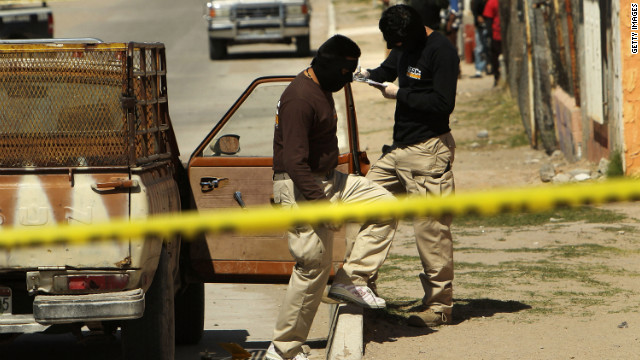
Police investigate the killing of two women in Juarez, Mexico, which has been wracked by violent drug-related crime.
STORY HIGHLIGHTS
- Deadly drug war among top issues as Mexican presidential hopefuls suggest new strategies
- Some U.S. lawmakers fear cross-border cooperation could wane after July 1 vote
- What's new: Three leading candidates are committed to working with U.S., analysts say
As candidates across party lines suggest new strategies, like reducing violence and taking troops off the streets, some U.S. lawmakers say they're nervous that cross-border cooperation could wane after Mexican voters pick a new president July 1.
Last week, a Republican congressman told the head of the U.S. Drug Enforcement Administration that he was concerned about Mexico's "impending change in power."
And Sen. John McCain, R-Arizona, said in February that he feared at least one Mexican presidential candidate was not committed to continuing his country's campaign against organized crime.
Worries in Washington as Mexico's election looms are a reminder of the close ties binding the neighboring nations. The two countries share billions of dollars in trade and a border that stretches for nearly 2,000 miles. Millions of U.S. citizens travel to Mexico every year, and millions of Mexican immigrants -- legal and illegal -- live in the United States.
"Almost no other country affects the United States as much on a day to day basis as Mexico," said Shannon O'Neil, a Latin American studies fellow at the Council on Foreign Relations.
"What happens in Mexico is hugely important for the United States."
For nearly six years, a brutal drug war in Mexico with a staggering death toll of more than 47,500 people has dominated discussions between the two countries.
Announcing a crackdown on cartels and sending troops into the streets to help fight the battle were among the first major moves by President Felipe Calderon after he took office in December 2006.
The United States voiced its support and offered $1.6 billion to aid in the fight. U.S. officials have praised growing cooperation with the Mexican government as a key weapon in the war on drugs.
Democratic Revolution Party candidate Andres Manuel Lopez Obrador is pledging "hugs, not bullets."
But on the campaign trail in Mexico this year, the three leading candidates have stressed the need to shift strategies.
Leftist candidate Andres Manuel Lopez Obrador of the opposition Democratic Revolution Party has summed up his security policy as "abrazos, no balazos" (hugs, not bullets).
He started his campaign with a pledge to pull back troops from Mexico's streets, but he said last month that the military would remain deployed until there is a "trained, skilled and moralized" police force.
Josefina Vazquez Mota of the ruling National Action Party has apparently tried to distance herself from Calderon's policies with a simple slogan: "Josefina Diferente" (Different Josefina).
"The results will be measured not just by criminals captured, but by how stable and secure communities are," her campaign website says.
Enrique Pena Nieto of the opposition Institutional Revolutionary Party (PRI) has pledged to focus more on reducing violence and less on catching cartel leaders and blocking drugs from reaching the United States.
He told CNNMexico that federal, state and local authorities would coordinate a better security plan on his watch.
"I propose adjusting the strategy and making a national front that involves the three levels of the government, focused on diminishing the violence in the country," he said.
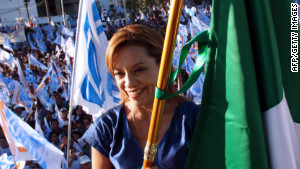
Josefina Vazquez Mota of the ruling National Action Party has appeared to distance herself from the incumbent's policies.
Some political opponents of Pena Nieto, whose party governed Mexico for more than 70 years until 2000, have warned that negotiating with drug cartels and gangs could be on his agenda -- an accusation that Pena Nieto has repeatedly denied.
But his denials haven't squelched speculation on both sides of the border that negotiating with cartels -- or at least easing the pressure on them -- could be on the table.
In a congressional hearing last week, U.S. Rep. Jim Sensenbrenner said the war on drugs was nearing a "potential crossroad," referring to Pena Nieto's plan and his party's political history.
"While in power, the PRI minimized violence by turning a blind eye to the cartels," the Wisconsin Republican said, noting that Pena Nieto "does not emphasize stopping drug shipments or capturing kingpins."
Minutes earlier, DEA Administrator Michele Leonhart had testified that Mexico had extradited more than 200 accused suspects to the United States since 2010.
"Without reservation, I would characterize the cooperation between United States and Mexico at an all-time high," she said.
Sensenbrenner said the close teamwork could be short-lived.
"I worry that the relationship could be at a high water mark with the impending change in power," he said.
In a statement the next day, Pena Nieto's campaign said he was committed to combatting organized crime.
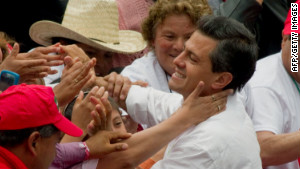
Enrique Pena Nieto of the Institutional Revolutionary Party has faced criticism from U.S. lawmakers.
"The law is applied, it is never negotiated," the statement said.
No matter who wins, the election will likely mark "a change from where U.S.-Mexico security strategy has been," said O'Neil of the Council on Foreign Relations.
But the shift is something U.S. officials who work with Mexico have prepared for, she said.
Robert Pastor, director of the Center for North American Studies at American University in Washington, said a change in presidential leadership will give Mexican officials a chance to consider fresh approaches to deal with drug-related violence and other issues that affect the United States, such as economic and energy policies.
"Between the three candidates and the predecessors, there would be an opportunity to reflect on what worked, and what didn't work, and how, perhaps things should be changed," he said.
The concerns from some U.S. lawmakers about a shift in drug war strategy are overblown, he said.
"All three of the major candidates have committed themselves to fighting drug trafficking and reducing the violence," Pastor said. "All three are very much committed to working with the United States."
That itself is a notable shift from past elections, when cross-border relations soured or sweetened based on who won the presidential vote, according to Andrew Selee, director of the Mexico Institute at the Woodrow Wilson International Center for Scholars.
"The U.S.-Mexico relationship has now matured to a point where changes in party and personality matter less than they used to," he said.
"This is a country that matters enormously for the U.S., and for the first time, perhaps, what happens in the elections won't change [that relationship] much."




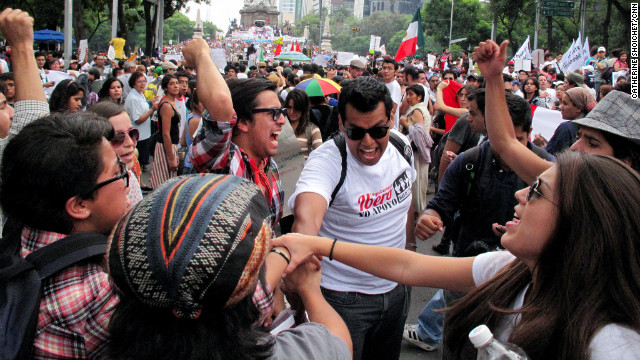 Students from the Iberoamerican University chant a school cheer during a protest last weekend in Mexico City. A video they uploaded to YouTube helped launch a nationwide youth protest movement. The demonstrators have added fuel to the political frenzy leading up to Mexico's elections on Sunday, July 1.
Students from the Iberoamerican University chant a school cheer during a protest last weekend in Mexico City. A video they uploaded to YouTube helped launch a nationwide youth protest movement. The demonstrators have added fuel to the political frenzy leading up to Mexico's elections on Sunday, July 1. 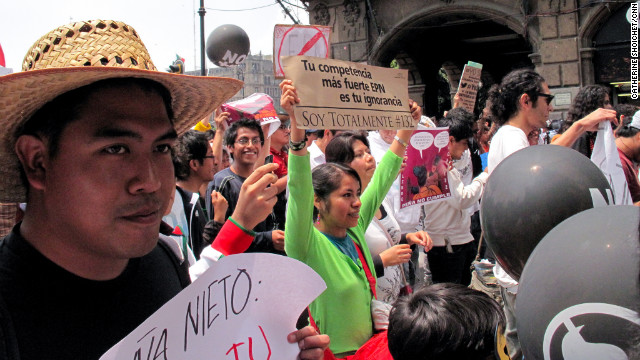 Youth demonstrators march in Mexico City, protesting presidential candidate Enrique Pena Nieto.
Youth demonstrators march in Mexico City, protesting presidential candidate Enrique Pena Nieto. 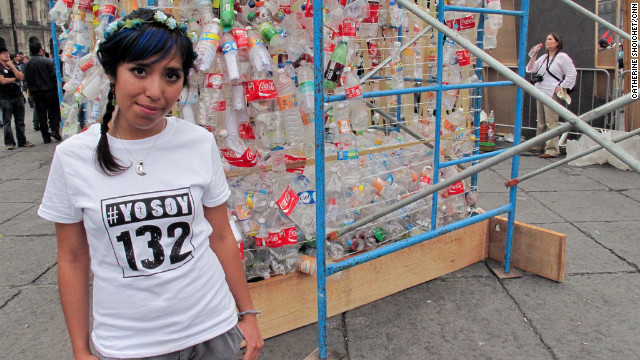 Selene Galindo Enriquez, 20, stands beside an art installation that she and other youth protesters helped create in Mexico City.
Selene Galindo Enriquez, 20, stands beside an art installation that she and other youth protesters helped create in Mexico City. 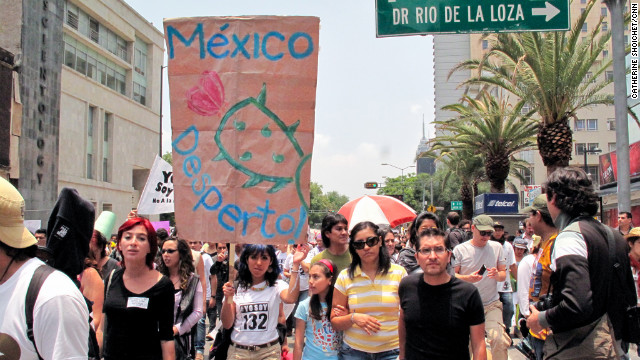 Selene Galindo Enriquez carries a handmade sign as she marches alongside other youth protesters in Mexico City. She said she plans to vote for the first time in Sunday's elections.
Selene Galindo Enriquez carries a handmade sign as she marches alongside other youth protesters in Mexico City. She said she plans to vote for the first time in Sunday's elections. 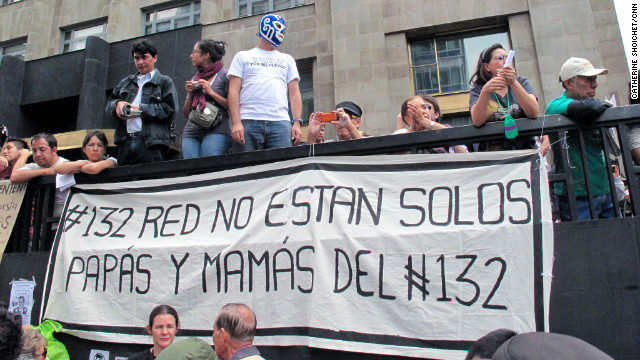 Parents of student protesters display a sign supporting the youth movement known as #YoSoy132. "You are not alone," it says.
Parents of student protesters display a sign supporting the youth movement known as #YoSoy132. "You are not alone," it says. 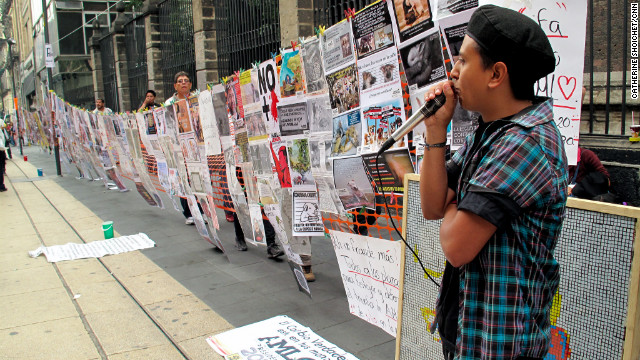 A youth activist in Mexico City urges passers-by to vote in the upcoming presidential election.
A youth activist in Mexico City urges passers-by to vote in the upcoming presidential election. 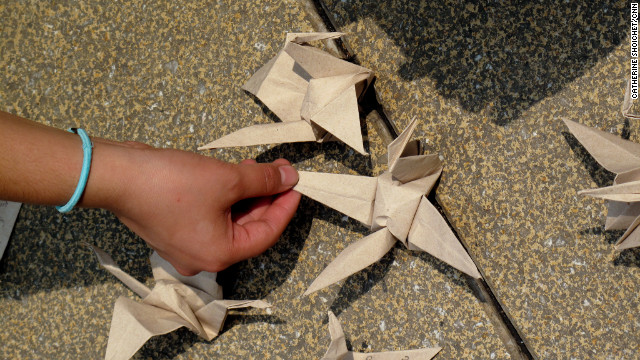 An activist in Mexico City places an origami bird on a sidewalk as part of an art project to promote peace.
An activist in Mexico City places an origami bird on a sidewalk as part of an art project to promote peace. 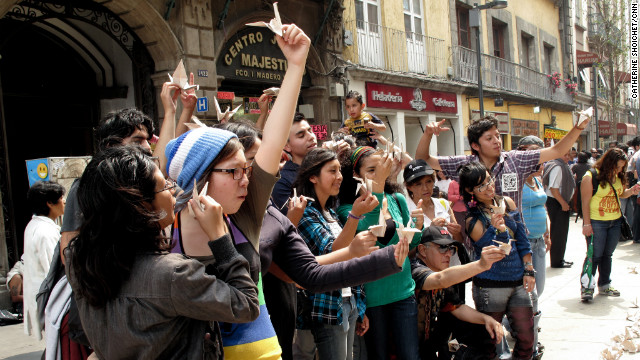 Youth in Mexico City pose with origami birds they made as part of a sidewalk art project to promote peace.
Youth in Mexico City pose with origami birds they made as part of a sidewalk art project to promote peace. 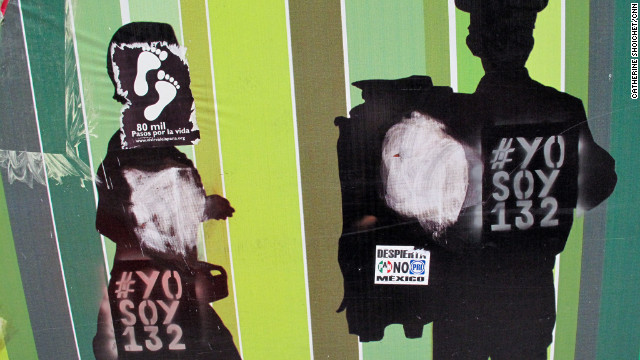 Graffiti supporting the #YoSoy132 youth protest movement covers a wall in Mexico City.
Graffiti supporting the #YoSoy132 youth protest movement covers a wall in Mexico City. 









No comments:
Post a Comment